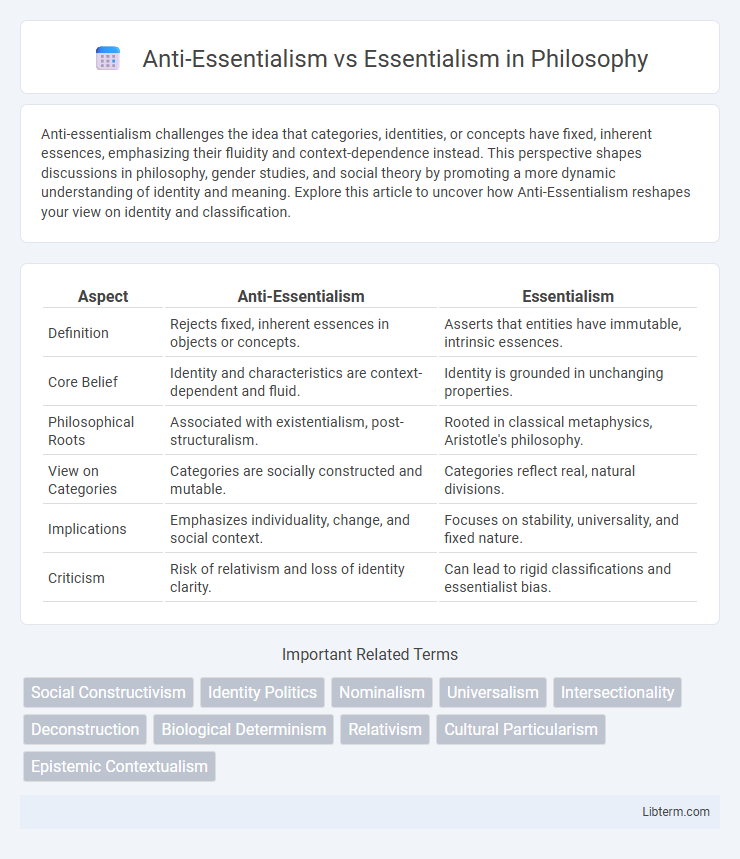Anti-essentialism challenges the idea that categories, identities, or concepts have fixed, inherent essences, emphasizing their fluidity and context-dependence instead. This perspective shapes discussions in philosophy, gender studies, and social theory by promoting a more dynamic understanding of identity and meaning. Explore this article to uncover how Anti-Essentialism reshapes your view on identity and classification.
Table of Comparison
| Aspect | Anti-Essentialism | Essentialism |
|---|---|---|
| Definition | Rejects fixed, inherent essences in objects or concepts. | Asserts that entities have immutable, intrinsic essences. |
| Core Belief | Identity and characteristics are context-dependent and fluid. | Identity is grounded in unchanging properties. |
| Philosophical Roots | Associated with existentialism, post-structuralism. | Rooted in classical metaphysics, Aristotle's philosophy. |
| View on Categories | Categories are socially constructed and mutable. | Categories reflect real, natural divisions. |
| Implications | Emphasizes individuality, change, and social context. | Focuses on stability, universality, and fixed nature. |
| Criticism | Risk of relativism and loss of identity clarity. | Can lead to rigid classifications and essentialist bias. |
Understanding Essentialism: Core Principles
Essentialism asserts that entities possess inherent, unchanging qualities defining their identity and purpose, emphasizing fixed characteristics across time and context. This philosophical approach underpins various fields, from biology--asserting species have essential traits--to social theory, where it contends that group identities stem from intrinsic attributes. Understanding essentialism involves recognizing its focus on universal, objective essences that shape reality and human experience intrinsically rather than through external or socially constructed factors.
Defining Anti-Essentialism in Modern Thought
Anti-Essentialism in modern thought challenges the notion that entities possess fixed, inherent essences defining their identity and properties. It argues that categories such as gender, race, and identity are socially constructed, fluid, and context-dependent rather than biologically or naturally determined. This perspective influences contemporary debates in philosophy, sociology, and cultural studies by promoting understanding through diversity and rejecting universalist assumptions.
Historical Origins of Essentialism and Anti-Essentialism
Essentialism, rooted in Plato's theory of forms and Aristotle's substance theory, asserts that entities possess inherent, unchanging essences defining their identity and function. Anti-essentialism emerged in the 20th century as a critique, influenced by social constructivism and postmodernism, challenging the notion of fixed essences and emphasizing the fluidity of categories shaped by cultural and historical contexts. The historical origins of essentialism in classical philosophy contrast sharply with anti-essentialism's foundation in contemporary critiques of identity, language, and power structures.
Key Philosophers and Influencers
Key philosophers of essentialism include Aristotle, who argued that entities possess an immutable essence defining their nature, and Plato, who posited the existence of ideal forms as true essences behind physical objects. Anti-essentialism is prominently shaped by thinkers like Michel Foucault and Judith Butler, who challenge fixed identities and emphasize the fluid, constructed nature of categories such as gender and knowledge. These contrasting views influence contemporary debates in metaphysics, identity theory, and social philosophy, highlighting essentialism's focus on inherent traits versus anti-essentialism's emphasis on context and social processes.
Essentialism in Cultural and Social Contexts
Essentialism in cultural and social contexts asserts that certain traits, behaviors, or characteristics are innate and biologically determined within specific groups, often leading to fixed identities based on race, gender, or ethnicity. This perspective influences social policies and cultural narratives by reinforcing stereotypes and limiting the recognition of individual and group diversity. Critiques of essentialism highlight its role in perpetuating social hierarchies and inhibiting social change by ignoring the fluid and constructed nature of identity.
Anti-Essentialism and Identity Politics
Anti-Essentialism challenges the idea that identities have fixed, inherent essences, emphasizing the fluid and constructed nature of social categories like race, gender, and sexuality. This perspective underpins identity politics by recognizing the diversity and multiplicity of experiences within groups, resisting homogenization and exclusion based on assumed universal traits. Anti-Essentialism promotes intersectionality and the acknowledgment of power dynamics, fostering more inclusive and dynamic political movements.
Comparative Analysis: Strengths and Weaknesses
Anti-essentialism challenges fixed conceptual boundaries, promoting flexibility and inclusivity by emphasizing context and social constructs, which strengthens adaptability in diverse disciplines but may lead to ambiguity and lack of clear identity. Essentialism offers clarity and stability by asserting inherent characteristics, facilitating coherent categorization and predictability, yet risks reinforcing stereotypes and ignoring socio-cultural dynamics. Comparative analysis reveals that while essentialism excels in establishing consistent frameworks, anti-essentialism's strength lies in its capacity to accommodate complexity and change.
Impact on Education and Pedagogy
Anti-Essentialism challenges fixed identities by promoting inclusive, student-centered learning environments that adapt to diverse experiences and perspectives, fostering critical thinking and self-reflection. Essentialism emphasizes a core curriculum based on universal knowledge and skills, aiming to cultivate discipline and mastery through structured pedagogy. The debate influences curriculum design, teaching methods, and assessment strategies, shaping how educators address diversity and student development in classrooms.
Relevance in Contemporary Debates
Anti-essentialism challenges the fixed nature of identity categories by emphasizing social construction and fluidity, which is increasingly relevant in discussions on gender, race, and ethnicity. Essentialism, asserting inherent traits within groups, faces criticism for reinforcing stereotypes but remains influential in certain cultural and political contexts. Contemporary debates prioritize anti-essentialist perspectives to promote inclusivity and recognize diverse experiences within social groups.
Future Directions in the Essentialism vs Anti-Essentialism Debate
Future directions in the essentialism vs anti-essentialism debate emphasize interdisciplinary research integrating cognitive science, sociology, and philosophy to better understand identity formation. Advances in neurobiology challenge fixed traits, supporting anti-essentialist views that identity is dynamic and context-dependent. Emerging frameworks focus on the interaction between genetic predispositions and socio-cultural factors, promoting nuanced perspectives beyond binary essentialist or anti-essentialist positions.
Anti-Essentialism Infographic

 libterm.com
libterm.com